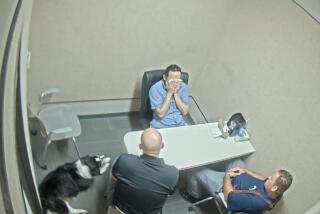Letter From Sol Price Conflicts With Son’s Claim in Distress Suit
- Share via
A lawyer for multimillionaire Sol Price, who is being sued by his estranged son Laurence for “intentional infliction of emotional distress,” produced a letter in court Tuesday showing that Price asked his son more than three years ago to talk to him so that they could mend the rift in their family.
“Now I feel free to tell you I am not your enemy--Nor is your mother or your brother,” Sol Price said in the letter. “When push comes to shove, you can count on us more than anyone else in the world other than your boys.”
The letter was written in January, 1986, several months after Laurence Price lost a legal battle to retain a lucrative lease his father had arranged for him to operate tire installation centers at the highly successful Price Club discount warehouses begun by Sol Price. The four-paragraph, handwritten letter was written during a period when, according to Laurence’s claim, he felt abandoned and rejected by his father.
Laurence, 43, is now suing his father for $100 million for emotional distress he claims his father inflicted on him by interfering with the raising of his sons, who are now 17 and 15. The interference was part of a lifelong pattern of emotional abuse Laurence claims he suffered at the hands of an authoritarian father.
The suit was filed Dec. 1, 1987, and, under California law, must refer to acts committed within the previous year. During that time, according to Laurence’s claim, Sol helped Laurence’s son buy a car without consulting him, causing Laurence anguish. Both sides have agreed to permit Laurence to produce evidence of intentional acts Sol committed against Laurence after the suit was filed, including taking Laurence’s son on a trip to see Stanford University without first consulting Laurence.
To win an emotional distress lawsuit, the plaintiff (in this case, Laurence Price) must show that the defendant (Sol Price) intentionally committed an outrageous act or that he committed an act that might not appear outrageous on the surface, but the defendant knew would be outrageous to the plaintiff. Evidence of the defendant’s earlier acts can be introduced to show that the defendant knew what it took to provoke the plaintiff.
In particular, Laurence alleges that his father threatened in 1984 to take away his business if he did not return his sons to their mother, who won custody of them after a divorce.
Upset About Incident
Laurence had taken the boys to his home one night because they were upset about an incident with their mother. Laurence lost his lease for the tire centers about eight months later.
However, Sol Price’s lawyer, Gerald McMahon, said Tuesday that Laurence filed the emotional-distress lawsuit only after losing an arbitration proceeding and exhausting all legal remedies to hang onto his tire centers, which, he said, Laurence mismanaged. Further, McMahon pointed out, Sol Price guaranteed increasing lines of credit for Laurence’s business even after Laurence had refused to return the sons to their mother.
McMahon produced the letter while cross-examining Laurence, who will take the witness stand for the third day today. The letter appears to bolster McMahon’s contention that Sol Price tried in many ways over a number of years to help his younger son, who was a problem child and a high-school dropout.
The letter reads: “Larry: Several months ago I drafted a letter to you but didn’t send it because I thought you might misinterpret my motives and assume I was trying to discourage you from pressing the arbitration.
“Now I feel free to tell you that I am not your enemy--Nor is your mother or your brother. When push comes to shove you can count on us more than anyone else in the world other than your boys.
“Can we find some basis for disagreeing without being disagreeable? If you feel you should go forward with the value arbitration--that’s fine--If you want to work out a reasonable settlement--that’s fine. Neither course should keep us from talking like adults and letting family ties be mended.
“So if you feel you want to talk--I’ll be happy to hear from you. Dad.”
Laurence conceded that he had received the letter and that he met with his father at a restaurant to discuss it. But, he said, they began to argue and parted angrily.
McMahon also cross-examined Laurence about an appearance he made last year with his lawyer, Marvin Mitchelson, on Phil Donahue’s talk show.
‘Felt It Was Important’
Laurence conceded that he made the appearance even though it distressed him to think about the events that led to the lawsuit.
“I felt it was important that what was going on in this case be brought to light, that the injustice of what was going on be aired,” Laurence said. “ . . . Maybe the other side would hear and realize the pain and suffering I’ve had, and other people might come forward and speak up for themselves.”
Laurence had frequent lapses of memory Tuesday when McMahon questioned him about more than $1 million in loans his father secured for him after threatening to take away his business. Laurence conceded that his father had arranged for a line of credit that eventually reached $1.2 million for the business and $500,000 for his house, but said he did not know what arrangement his father made with Wells Fargo Bank to secure the notes.
McMahon said Sol Price had personally secured the loans for his son and eventually had to pay off a large part of the money himself when Laurence defaulted.
“Did it cross your mind that, if your father wanted to be mean to you, he could just stop guaranteeing the notes?” McMahon asked.
“No,” Laurence replied.
The trial continues today before Superior Court Judge Arthur W. Jones.
More to Read
Sign up for Essential California
The most important California stories and recommendations in your inbox every morning.
You may occasionally receive promotional content from the Los Angeles Times.












